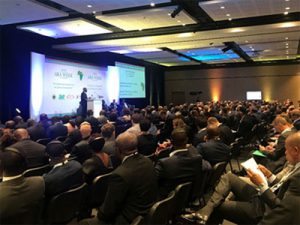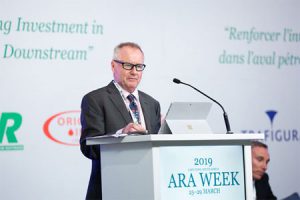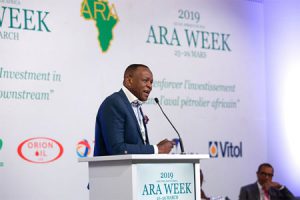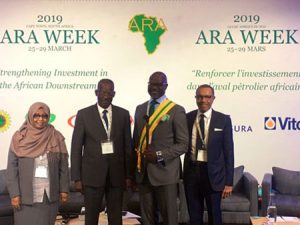ARA WEEK 2019
Record attendance, serious mood
A record of over 500 delegates attended this year’s ARA WEEK conference in Cape Town held at the Century City Conference Centre, up slightly from last year’s attendance.
The mood in the room appeared serious as delegates rolled up their sleeves to discuss the difficulties, highlighted throughout the conference, in raising the finance needed to meet the conference theme – Strengthening Investment in the African Downstream.

The conference opened brightly with the Ivorian Minister of Petroleum, Energy and Renewables, Abdourahmane Cissé, showing a welcome willingness to discuss openly the financing challenges faced by the Abidjan refinery. He described in detail the tortuous discussions while he had held the post of Budget Minister when the refinery first tried to reschedule its debts and raise finance for the necessary improvements needed to produce cleaner fuels. The conclusion of a debt package, that was covered in detail later by Tariye Gbadegesin of the African Finance Corporation, for $600mn has done much to appease the day to day financing problems of the refinery.
However, as discussions continued during the week, it became apparent that this financing came with some conditions attached. The Ivorian government has had to guarantee the debt and other restrictions were imposed from multi-lateral lenders, and the re-structuring, although reducing the debt burden of the refinery, may not be sufficient to meet any future capital requirements. Indeed, the Minister stated that he would be approaching the refinery shareholders for their financing plans in the weeks to come.
Throughout the conference, African refiners made pleas for their governments to support them, but on the second day presentations by AFC’s Gbadegesin, Dr Rose Mwebaza, Chief Natural Resources Officer of the African Development Bank and Paul Eardley-Taylor of Standard Bank all stressed the constraints of raising finance for capital projects. They stressed the need for competing projects for funds to build their case on economic grounds and risk analysis, paying due attention to environmental and social impacts, as they compete for public and private contributions alongside health, education, transport infrastructure, agriculture and industry. Dr Mwebaza highlighted the funds being attracted into renewable energy and the African mid-stream, while Eardley-Taylor presented the funding requirements of the massive Mozambique LNG projects.
On the third day, the conference moved on to look at the investment and improvements needed in the storage and distribution sector with emphasis on the encouraging role that can be played by the Energy regulator. Presentations by Hippolyte Bassolé of Sonabhy (Burkina Faso), Esther Anku of the National Petroleum Authority (Ghana), Rojo Ranaivoson of Office Malgache des Hydrocarbures (Madagascar), Moosa Karodia, Puma (South Africa) and Dr Hendrick Fischer of EFOA (Europe) all laid out the environmental, safety and economic challenges facing the sector.
A completely different spin was put on the requirements of financing banks, society, and indeed of the investing companies themselves, by a lively discussion on Corporate Social Responsibility, managing human capital and local content led by James Nicholson (Trafigura), Mark Ware (Vivo Energy) and Derek Bultitude (UOP).
For such companies to demonstrate such commitment to subjects that are usually relegated to the small print of investment decisions, and then forgotten, was a clear sign that Africa is transforming the way it is doing business; a theme picked up by Gary Still of CITAC Africa in his address to the conference:

However, the highlight of the conference was a barnstorming performance by Tope Shonubi, CEO of Sahara Energy, in a presentation that lifted the spirits, and sent a strong message that Africans can, and must, succeed on their continent and not rely on international companies to build their businesses for them.

Mr Shonubi told the Africa transforming story from the view point of an African, seeing the opportunities around him as the continent has developed. He expressed his pride that Sahara was one of the first African companies to carry out full cycle crude and product trade transactions using only African resources within the continent – with African crude source, African refinery, African bank, African trader, supplying African product markets.
His main theme, however, was that the introduction of more harmonised markets was essential across Africa, leading to favourable economies of scale in intra-regional trade, improved local refining capacity which would reduce landed costs of petroleum products, creation of more influential economic blocs assuring better negotiations and access to markets and more trade deals, joint regional infrastructure projects, and wider export diversification with access to a larger customer base. His argument was not just for petroleum but he argued that clearly the adoption of unified petroleum product standards across Africa would allow the creation of wider regional product markets, ease intra-regional petroleum product trade, reduce bulk transportation costs and optimise regional logistic infrastructure; regional harmonisation of taxes, excise duties and subsidies would also significantly reduce smuggling and adulteration of fuels.
Mr Shonubi closed with a Swahili proverb – umoja ni nguvu mgawanyiko ni udhaifu: unity is strength; division is weakness – and a quotation from Jose Manuel Barroso, former EU Commission President: “African countries cannot hope to shape globalisation or even retain marginal relevance individually. It is only together that we have the weight to influence the big picture. “
 The formal part of the conference, the African Refiners & Distributors Association’s Annual General Meeting, closed with Anibor Kragha of NNPC (Nigeria) appointed to the role of President of the Association suceeding Hilaire Kaboré of Sonabhy (Burkina Faso). Serigne Mboup of SAR (Senegal) will be the new vice-President.
The formal part of the conference, the African Refiners & Distributors Association’s Annual General Meeting, closed with Anibor Kragha of NNPC (Nigeria) appointed to the role of President of the Association suceeding Hilaire Kaboré of Sonabhy (Burkina Faso). Serigne Mboup of SAR (Senegal) will be the new vice-President.
The 2019 conference confirms that ARA WEEK remains the premier Africa Downstream meeting place and policy forum with unrivalled networking opportunities. Along with the high number of registrations, the attendance in the conference hall over all three days remained excellent. Presenters and presentations were of a high quality and no-one shied away from debating some complex and difficult subjects.
CITAC Africa is the retained consultant to the ARA – African Refiners & Distributors Association
